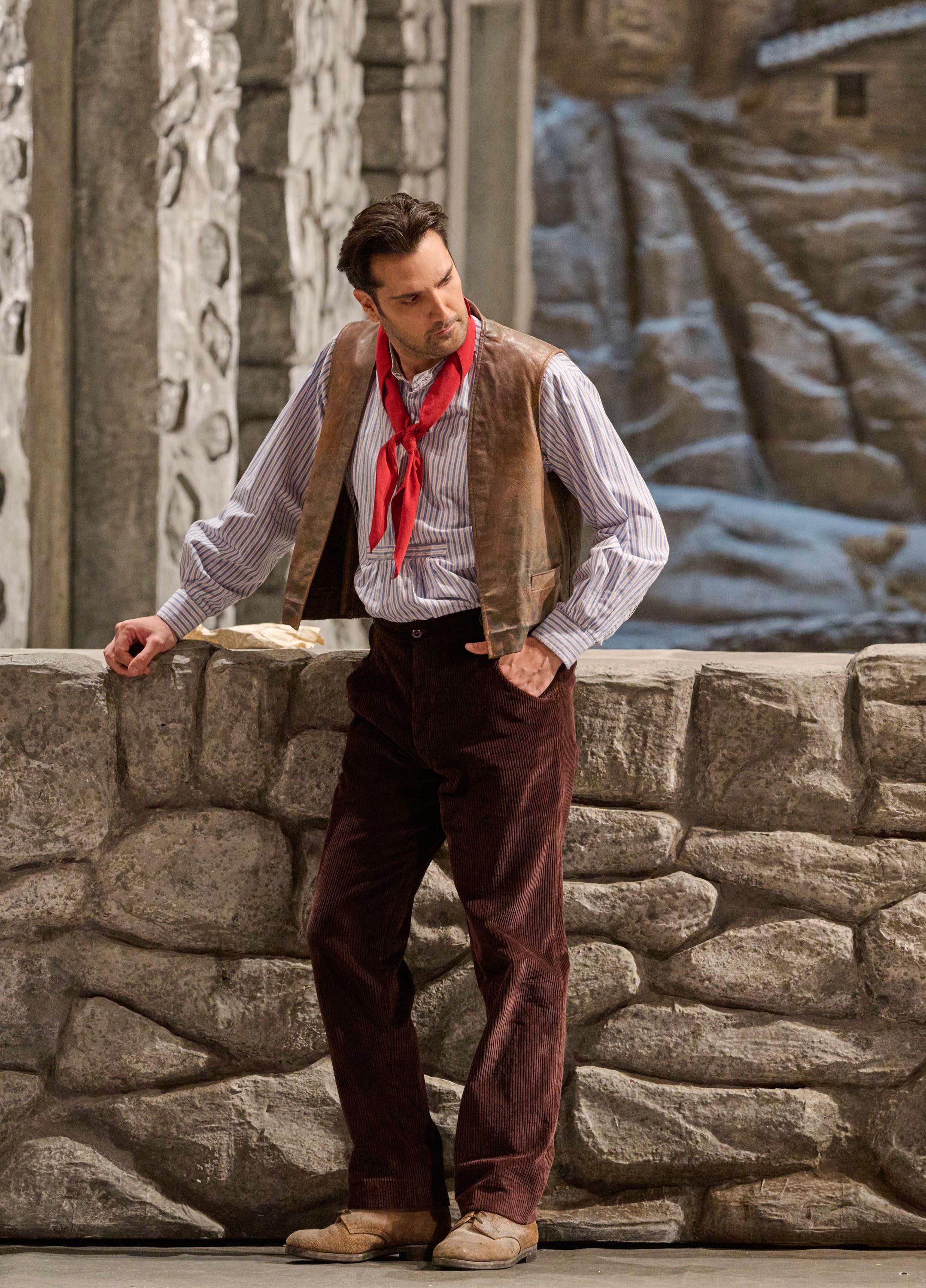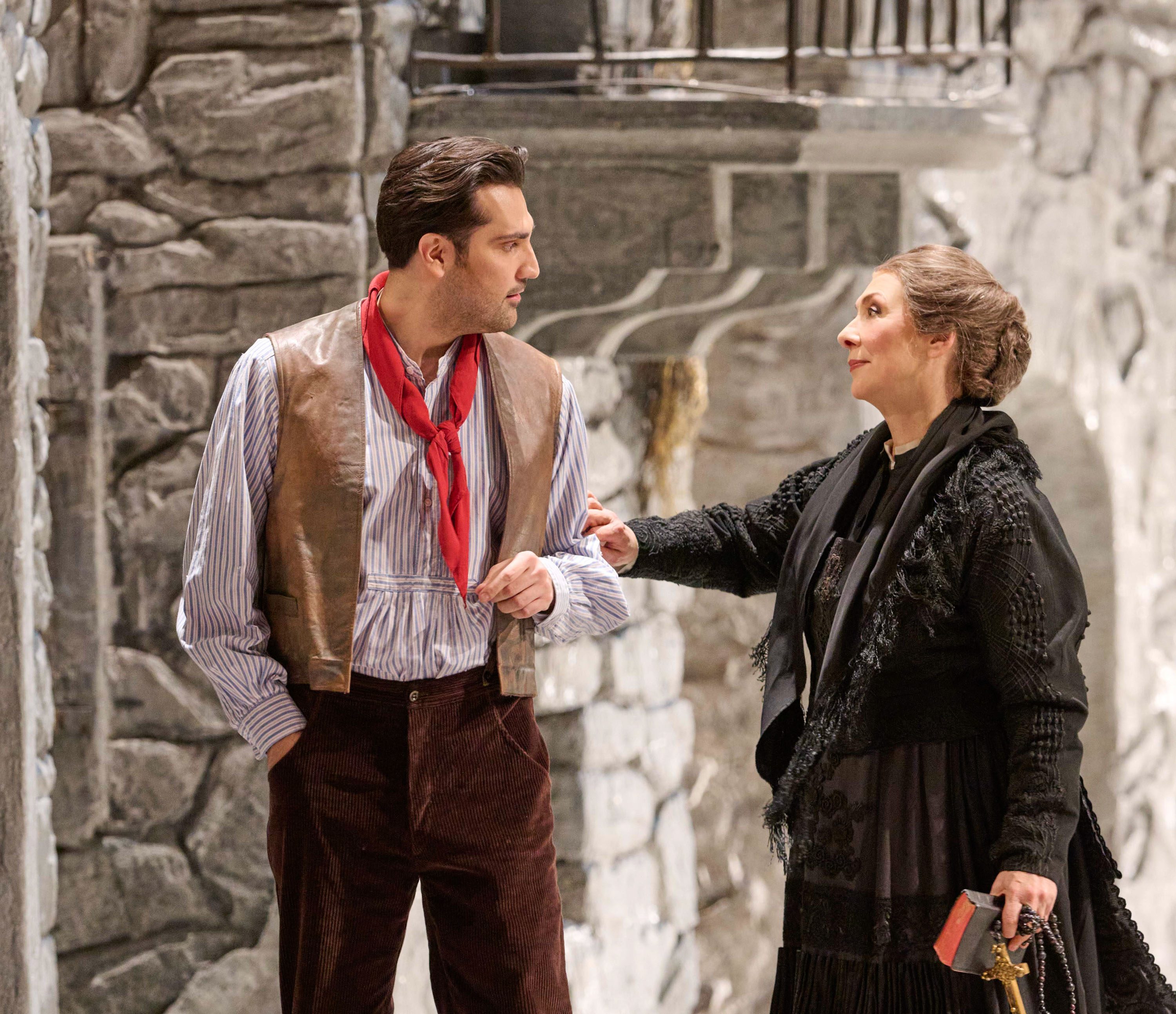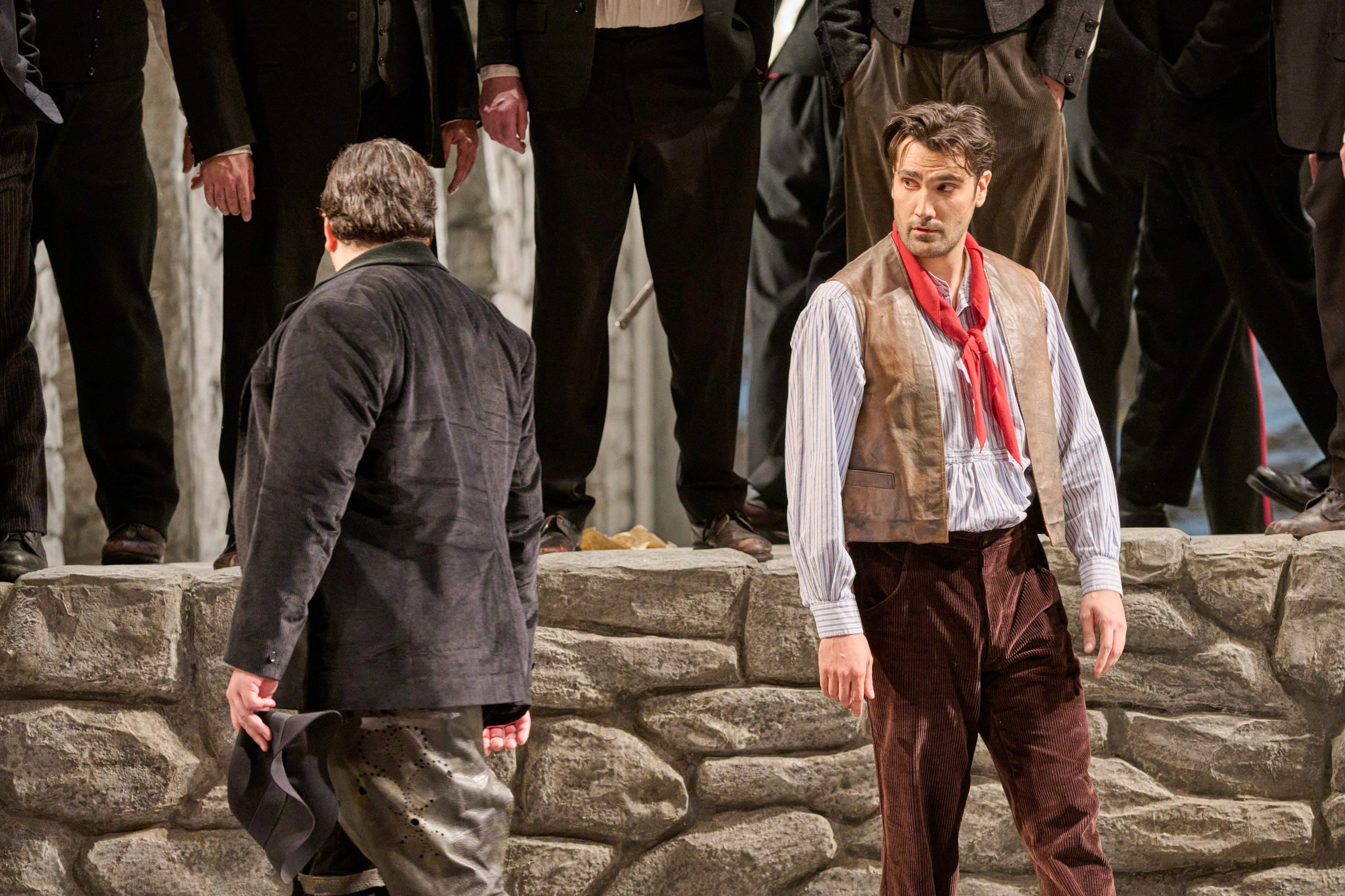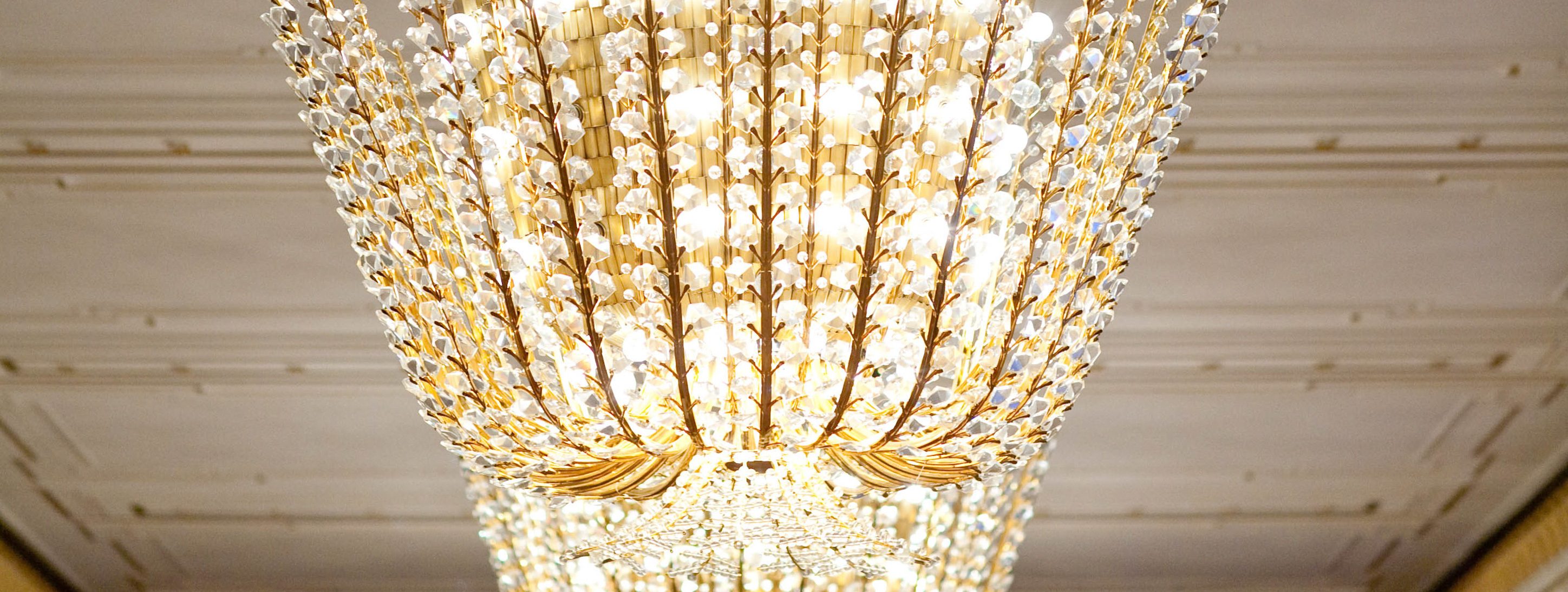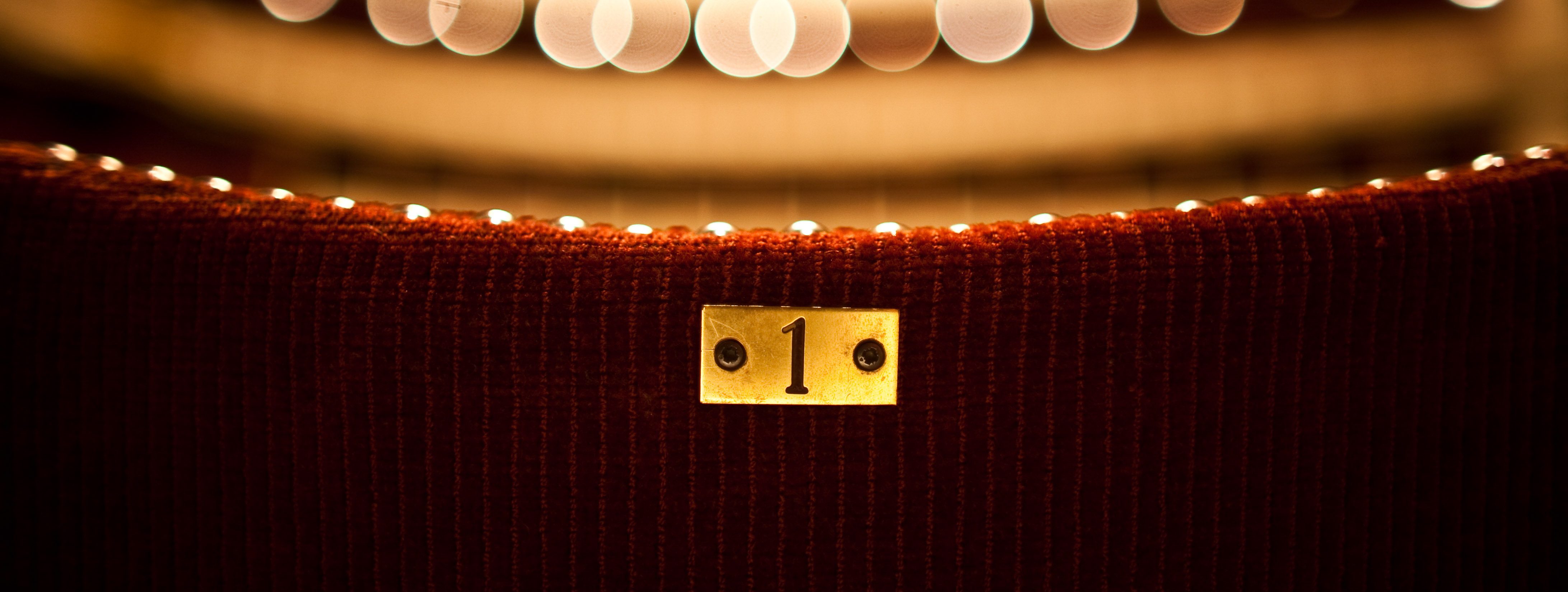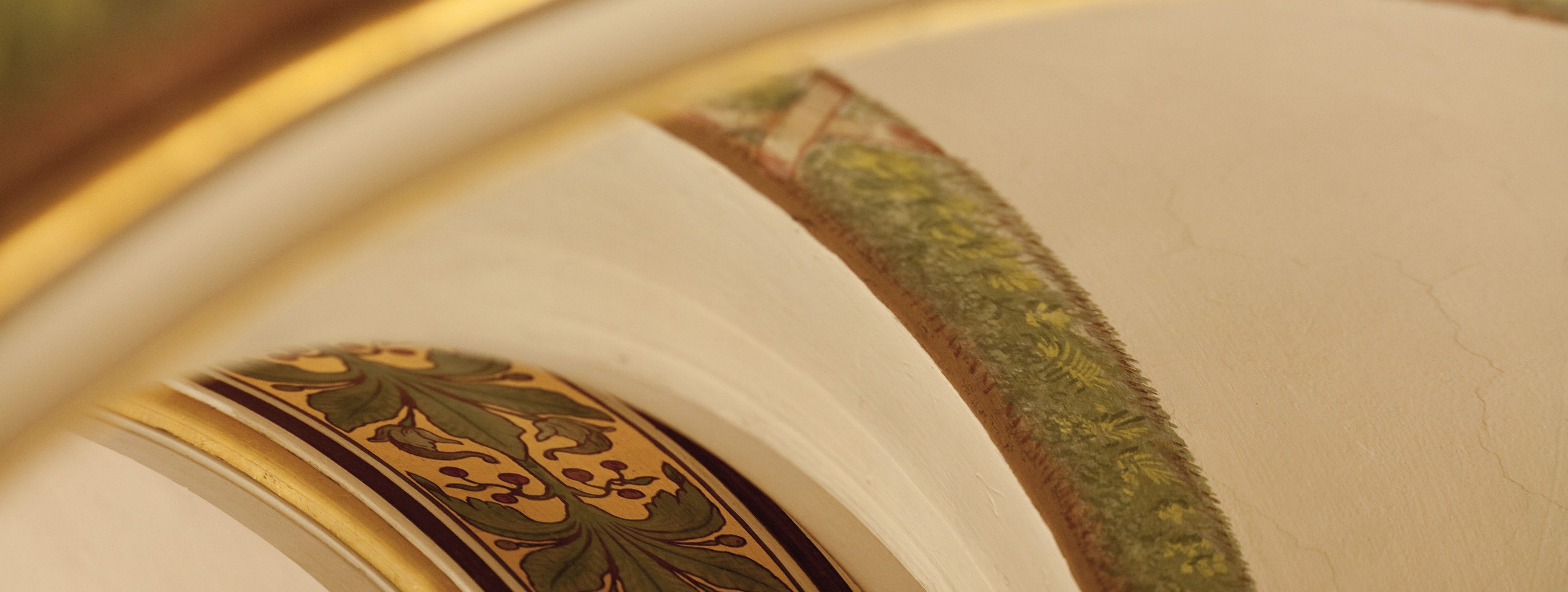
About the Production
Cavalleria Rusticana
Before being called up for military service, Turiddu was engaged to Lola, who married the wealthy Alfio while he was away. Turiddu then tries to console himself with Santuzza, but starts another affair with Lola. Santuzza recognizes his infidelity, is deeply hurt and, in her anger, reveals Lola's adultery to Alfio. A duel takes place between Alfio and Turiddu. The cry "Turiddu has been murdered!" ends the tragedy.
Pagliacci
Canio, the principal of a comedy troupe, keeps a close eye on his wife Nedda, who feels constrained by his jealousy. She has fallen in love with Silvio, a young farmer, and the two want to flee together. But Tonio, whose love she has previously rejected, seeks revenge and betrays her to her husband Canio, who threatens retribution. The situation escalates during the troupe's performance: Play and reality mix, Canio kills Nedda and Silvio.
Cavalleria
Rusticana /
Pagliacci
Storyline
Turiddu was engaged to Lola before he was called up for military service. When he returns home, he is disappointed to discover that Lola has become the wife of the wealthy Alfio. Turiddu tries to console himself with Santuzza..

Easter morning in a Sicilian village.
Turiddu sings a serenade for Lola, with whom he has reconnected. Spring brings joy to the villagers. Santuzza, driven by inner turmoil, looks for Turiddu at his mother Lucia's, who runs a bar in the village square. Alfio, who has been away on business, returns and sings of his wife's fidelity. Easter bells call the villagers to the morning service.

Santuzza, who feels sinful because of her relationship with Turiddu and has therefore remained outside the church, suspects his infidelity and confides her worries to Turiddu's mother. He is confronted and resorts to excuses. But when Lola passes by, he forgets Santuzza and her accusations, pushes her away and runs after Lola. Santuzza curses him. Deeply offended and hurt in her honor, she tells Alfio about his wife's adulterous relationship with Turiddu. Alfio's anger leads to an oath of revenge. Only now does Santuzza realize in despair what a fatal development she has initiated.

-Intermezzo sinfonico-
After church, Turiddu invites everyone to a traditional drink. He also offers Alfio a cup. He refuses curtly. Turiddu realizes that Alfio knows about the adultery. A duel is demanded according to Sicilian ritual. In his burgeoning fear of death, Turiddu asks for his mother's blessing and asks her to protect Santuzza. He then faces the duel at the agreed location. The cry "Turiddu has been murdered!" ends the tragedy.
Tonio, a comedian who plays Taddeo in the Commedia, takes the place of the poet as prologue and explains the play to the audience in programmatic outline: the author, even though he uses masks, wants to be nothing other than a painter this time, whose subject is real life. However, one should not linger over the dance of masks, but immerse oneself in the souls of people.

The action takes place on the day of the Assumption (August 15). Canio's troupe of comedians arrives, warmly welcomed by the townspeople. In addition to Nedda, the principal's wife (in the Commedia Colombina), Beppe (in the Commedia Arlecchino) and Tonio are also part of the troupe. Canio (in the Commedia Pagliaccio) announces his performance for tonight. When Tonio tries to help Nedda off the wagon, Canio jealously pushes him away. The comedians are invited to a drink. Someone jokes that Tonio is only staying behind to have a rendezvous with Nedda. Canio reacts violently: he may play the cuckolded husband in the comedies, but in real life he would not tolerate infidelity.

Bells call for the evening church service. Nedda is disturbed by Canio's barely veiled threat. She feels constricted by his jealousy, wants to escape her invisible cage and be as free as a bird... Tonio has overheard them. He wants to force his love on Nedda, but is scornfully rejected. Full of rage and threatening revenge, he makes his escape. Silvio, a young farmer with whom Nedda has fallen in love, appears. He implores her to leave Canio and flee with him tonight. After some initial hesitation, she agrees, unaware that Tonio has overheard them both and hastens to summon Canio from the nearby osteria.

Just as Nedda is saying goodbye to her lover, Canio rushes out, furious with jealousy. Silvio manages to escape unrecognized. Canio's rage now turns against Nedda. He threatens her with his knife and demands that Nedda reveal the name of her boyfriend. But she remains silent. Beppe is able to snatch the knife from Canio and prevent the worst from happening. The audience is about to appear to watch the performance. Canio struggles to calm down and gets ready for the performance.

Shortly before the Commedia begins: Tonio beats the big drum and the spectators, including Silvio, arrive expectantly. Nedda, who collects the money, warns her lover of Canio's jealousy. The game between Colombina, Arlecchino, Taddeo and Pagliaccio begins. When Nedda, in her role as Colombina, shouts the same words she shouted at Silvio to the serenade singer Arlecchino as they say goodbye, Canio sees the game and reality become blurred.

Outraged with jealousy, he demands to know the name of Nedda's lover on stage. Colombina/Nedda tries to resume the play, but Canio becomes increasingly threatening. The audience also begins to suspect that this is about more than just theater. When Nedda stubbornly remains silent, Pagliaccio/Canio stabs her and kills her. Her cry for help, addressed to Silvio, results in Canio turning to the man who has come running and fatally hitting him too. - La commedia è finita" - The play is over.
Cavalleria Rusticana
The production shifts the action to the 1930s and thrives not least on numerous nuances, colors and small gestures: Santuzza's only hinted-at pregnancy, which makes her situation seem all the more hopeless, the fact that she obviously realizes from the start that Alfio knows full well about his wife's adultery, the reinforcement of the couleur locale through the inclusion of the children who are so important in society. It emphasizes the strength of the individual women, who, under the pressure of the prevailing stock reactionary machismo, hardly dare to articulate themselves, or only within certain conventions. Inwardly collapsing, they stand almost frozen in front of the audience, in stark contrast to the lamenting women in the background, who "officially" give space to their suppressed feelings.
Pagliacci
Jean-Poierre Ponnelle always saw before his inner eye a concrete situation, an atmosphere, an image that he wanted to bring to life on stage. He rarely showed anything, preferring instead to explain his ideas. He explained them vividly - and at the same time invited the singers to participate in the creation of an idea. The production shifts the action to the 1930s and lives not least from numerous nuances, colors, small gestures: the tiny and ever-growing car of the approaching comedian troupe appearing on the horizon - such and similar only apparent trivialities prove the playful joy with which Jean-Pierre Ponnelle enriched these productions, which therefore appear just as fresh and valid even after three and a half decades as they did on the day of the premiere.
Cavalleria Rusticana
After the sensational success of its premiere in 1890, Mascagni's Cavalleria rusticana conquered the stages of the world more quickly than almost any other work in opera history. The emotionality of the folkloristic musical language, the lush melodies and the concise dramaturgy of the subject matter have ensured that this one-act opera remains popular to this day. Mascagni wrote the opera for a competition in which a one-act opera was required, which also had an effect on the form: the individual numbers are short and very taut. Everything happens quickly, aiming directly for the climax. In keeping with the subject matter, the composer often uses something unpolished, almost coarse, in the sound - especially in the brass. Musically, Mascagni develops Verdi's tradition further and transcends previous boundaries, but clearly comes from the world of Italian opera, originating in bel canto.
Pagliacci
Leoncavallo was a master of the art of instrumentation: he repeatedly divided the violins, for example, and demanded flageolet effects from the strings, i.e. unusual forms of playing and sound. And he pays attention to small nuances: Nedda's "Bird Song", for example, is introduced by two interwoven harps, to which Leoncavallo has the violins play complex figures in sections and places four solo violins over the whole, intoning chords sustained an octave higher. The sound is clearly influenced by French music. At the same time, there is also an influence from the German school of composition: in the Pagliacci orchestral prelude, there is a characteristic motif that is played piano in the horn. In Canio's central aria, "Vesti la giubba", it returns - more tragically - and can be heard a third time at the end of the opera. Such a dramaturgically striking use of motifs was unknown to Verdi, for example.
Cavalleria Rusticana
The composer later recalled the premiere: "Finally, the day of the premiere, May 17th, arrived. Anyone who has not been to the Teatro Costanzi cannot imagine what took place then - an unforgettable evening in the life of an artist! Nobody would have expected such a success. The audience went crazy. All my hopes, all my expectations were exceeded by reality. I was called in front of the curtain sixty times. When I appeared in the spotlight in front of the frenzied audience, I thought I was dreaming. I came and went like an automaton; suddenly the knot in my throat loosened and I began to cry like a child. I felt all the joy that I could now offer my wife, my children and my father a comfortable life... I saw everything in a new light... I thought of all this while the audience applauded... applauded..."
Pagliacci
Pagliacci belongs to the so-called musical verismo. This refers to a narrow genre that originated in literature and aimed to show unvarnished, unembellished life. This form was characterized by strong emotions, often violent finales, abrupt endings and themes from everyday life. In addition to Pagliacci , Mascagni's Cavalleria rusticana is one of the central works.


